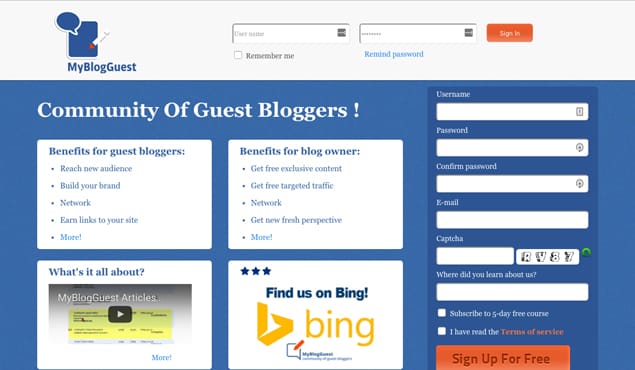If you’ve come to this article, odds are you’re in the guest posting game. Either you’re a guest post author who’s looking for a new resource to pitch to publishers, or a publisher that’s looking for a site to help them get great content.
The above is, in a nutshell, what MyBlogGuest.com was famous for. The site connected guest post authors and publishers in a mutually beneficial way. I write “connected” because back in 2014 MyBlogGuest was hit by a major penalty from Google, effectively killing the site and sending a dark wave of caution in the online content creation field.
Before I get into the effective and working alternatives to MyBlogGuest, it’s important to understand what happened.
MyBlogGuest Goes Down
MyBlogGuest is a blogging hub run by Ann Smarty. The site is still alive, but its reach has been greatly diminished since the Google crackdown in 2014.
In short, MyBlogGuest allows authors to post articles on the site, which publishers could bid for. The author has the option to set the price, and the publisher has the ability to pitch a new price. MyBlogGuest has authors upload their articles on the site outright, so the content is already written and ready to go. Once a publisher selects an article, and the author says “OK,” the publisher proceeds to post the article on its website, including the author’s byline.
All of this seems fairly legit, if a little too easy. After all, great content is king of the web, and this service makes the uploading of that content just a click away. While some larger institutions and writers may not like this, it’s a great way for aspiring blog authors to get their articles on well-ranking sites.
The key to MyBlogGuest for authors was that every single article was guaranteed to include dofollow backlinks. A dofollow backlink is a hyperlink that points where you want it to, typically back to your own website, which helps to build page authority. Backlinks are one of the primary methods by which Google’s algorithms determine how legitimate your site is, which in turn translates to a higher spot in Google’s search results.
Everyone is trying to get to the top of page one — those with the best backlinks get to the top. This is a complicated topic, so the above is a very simplified version of how it works.
The important bit is that MyBlogGuest required all publishers to include dofollow links on every article taken from MyBlogGuest, which Google did not like.
Even if these links were relevant and interesting, the potential here for spam was too great for Google to let it continue.
MyBlogGuest was made an example of by the search giant, and nothing quite like it has come around again.
Alternatives to MyBlogGuest
If the above is any indication, there aren’t any exact replicas of MyBlogGuest. Google sent the message so loud and clear that nobody has been foolish enough to copy the methodology, or those that have are back so far in the pages of search that nobody knows what they are.
That doesn’t mean guest posting is dead, and it doesn’t mean there aren’t similar sites you can use; it just means you’ll have to resort to some other methods for getting your guest posts out there.
Guest posting effectively creates three positives for writers:
- When you guest post you get a byline on a website, which means your name will come up in Google and you’ll have a published, ready-to-read example of your work.
- If the blog you get published on is big enough and you are active with it, that exposure can mean a serious growth of your community. New subscribers, new followers, and the building of an audience are all possible.
- This is the most coveted aspect of guest posting, but it’s not always guaranteed. Backlinks help you a ton in search engine results.
While MyBlogGuest made each of these very easy for authors, it was never an above-board method. The alternatives below are.
Searching Guest Blog Lists
You may have tried this already. If you haven’t, it’s about time. The key to being a successful guest poster is pitching sites that accept guest posts. In order to do that, you have to know which sites accept them.
MyBlogGuest took this process out of the equation, which left a lot of semi-successful guest posters with no real skills for searching out blogs that would accept their contributions.
The classic way to do this is by simply searching Google. Go to Google, type “guest blog list” into the search bar, and voila. You’ll get 38 million results (in about .46 seconds, depending on your connection). While each of those millions is not going to be excellent, a lot of the top tier results are decent.
You can use other search terms, like:
- “list of blogs accepting guest posts”
- “blogs that accept guest posts”
- “guest post blogs”
The list could go on, but those are the most common terms that will get you the results you want.
Typing in the search terms is the easy part; the hard part is sorting through all the crap (excuse me, chafe) to find the golden wheat articles that have blogs you’ll actually want to submit to.
The big difficulty in this industry is just how many websites are out there, how many change their guest posting policies on a regular basis and how many blogs look legitimate that are actually spammy.
Some of these articles list hundreds of sites, but many of those sites may be down or spammy. Keeping long lists like that updated on a monthly basis is a chore, one that most website owners won’t go through the trouble of doing.
You’ll need to develop a keen sense of what sites you can actually submit to. Do this by visiting an article, then visiting a wide sample of sites listed in that article. To check the legitimacy of an article I visit at least 10 of the sites it lists, if not 20, to get a gauge.
You might as well visit ones that you might want to write for, because if they are legitimate, you’ve just found 20 sites you can submit to. If you find a number of these spammy, outdated, or inaccurate in some other way, steer clear of the article itself.
Other ways to check the validity of an article:
- People will often comment on articles like this, saying that they are either great or terrible. Look for the most recent comments to see if the list is up to date.
- Well-written. This is not always true, but when you find a 300+ list that is written with terrible grammar, constant punctuation drops, and spelling mistakes, it’s hard to take it seriously. There are a lot of people in this field (guest posting and online marketing) that don’t speak English primarily. The best ones will note that somewhere in their article, showing how they want to help the community, rather than have a high-ranking article on Google that is pretty much worthless.
Use your best judgement, and avoid spammy or low quality websites.
Pitching Blogs and Larger Sites
Finding a good list of guest post-accepting blogs is a sure fire way to start your outreach. However, keep in mind that you can always send a friendly email to a blog you love to see if they might accept your guest post.
Some bloggers may roll their eyes at this advice, and slam their heads into their desks, but it has to be said. Tenacity is a real thing, and people get real results from it. If you think you’re an incredible writer with a unique and insightful topic that deserves to go on your favorite blog, send them an email saying as much.
Maybe they won’t publish your post, maybe they’ll co-author it with you, maybe they’ll do you a one-time honor because it really was that good. You never know. At the least it will alert them of your presence, which is an important a networking tool.
There are some big caveats to this step:
If you take this route and decide to send an unsolicited email with the hope of getting a guest post out of it, think of yourself as a door-to-door salesman (or missionary) who has come, unannounced, to convince someone of something. Prepare to get denied; prepare for no answer; prepare for a less-than-enthused answer back.
But above all, be highly professional in your outreach. You have to be both convincing, gracious, generous, and complimentary while presenting a truly unique idea to even get noticed, so do all those things.
Then (and this is tough), don’t expect a single thing in return.
Mainstream Media Sites
While pitching blogs can work really well, also remember that almost any mainstream media site out there will accept a post if your content good enough, if you have connections, or if you’re an established name.
Sites like Huffington Post, Inc, Forbes, etc. all have regular contributing authors that aren’t staff members. Those are, in effect, guest post authors; they just have a different title.
You should definitely start with blogs that accept guest posts specifically, but don’t rule out the bigger sites. They might not include a dofollow link, but the exposure may be well worth the work.
Two Real Alternatives to MyBlogGuest
The above methods can yield amazing results, but it is time consuming. Time is often the largest impeding factor in a writer’s success, so the key would be to minimize your search efforts and increase how much content you write.
Since MyBlogGuest and sites like it have a negative association around them, consider these two other offerings.
Guest Post Tracker
This tool makes all that hard search work much easier. In essence Guest Post Tracker is a curated, frequently updated list of blogs that accept guest posts. Not only does it point you in the right direction, but Guest Post Tracker keeps track of the submissions you have made, including your anchor text.
This is starting to look pretty amazing, right? The main impediment with Guest Post Tracker is that it’s a paid service. For a one-time fee (either $47, $97, or $147), you get unlimited lifetime access to Guest Post Tracker’s software, which you have to use and sign into for any of this to work.
The base cost allows you to track submissions for one of your websites, while the middle-tier allows up to 10 websites and multiple users. It’s not that much money considering the effect it could have.
The other downfall is that you’ll start to see a lot of the higher-end sites in Guest Post Tracker actually charge the author money to put up a guest post. That’s how it is these days; but that’s also a huge no-no from Google’s side of things.
I don’t know how this will play out over time, but it’s how Guest Post Tracker currently functions. Do some more research on this service and use it to your advantage — it really can help narrow down and speed up the process.
Guestpost.com
I’d be remiss if I didn’t mention the site you’re reading this on, Guestpost.com. This site does two primary things (beyond a blog, of course):
1. List Sites Accepting Guest Posts
Guestpost.com is continually updating its database of websites that accept guest posts. It has a curated blurb about every site, including what kind of content they want, what the submission guidelines are, and what the site itself is about. It also includes Domain Authority, Alexa rank, and a host of other metrics so you get a sense of how legitimate the website is.
This database is completely free; it’s there for guest post authors to use. The websites are broken into different categories, which helps authors narrow to a specific field.
2. A Paid Guest Post Service
On the paid side of things, Guestpost.com (this site) offers custom content creation for bloggers that want to get out there, but don’t want to write the actual post. Whether their written skills are terrible, they have no time, or simply don’t want to do it, it’s not uncommon for blog owners to outsource their content.
This may come as a surprise, but it really shouldn’t. Business oriented people aren’t always writers, but they can typically make money.
A team of U.S. based writers will write an appropriate guest post for a publisher. The service will then pitch the article for you, and do its best to get it published.
There are no guarantees for publication in this method, and there are no guarantees for dofollow links (or any links) if the publication is accepted.
This distinction is key, as it’s quite different than MyBlogGuests’ model, which guaranteed a dofollow link.
For those looking to get great content on high-ranking sites, this is an excellent option. Posts range from $100-$200, and you won’t be charged if the post doesn’t get published.
Wrapping Up
MyBlogGuest was the top dog in the guest post community until Google smacked it down. The fragments of the guest post world are a bit scattered, but there are some good, ready-made options now available.
You can always do the dirty work yourself, which will probably result in more connections and a better understanding of the guest post business. Whatever method you decide, use guest posting to your advantage. It’s worth it.
 ContentPowered.com
ContentPowered.com








